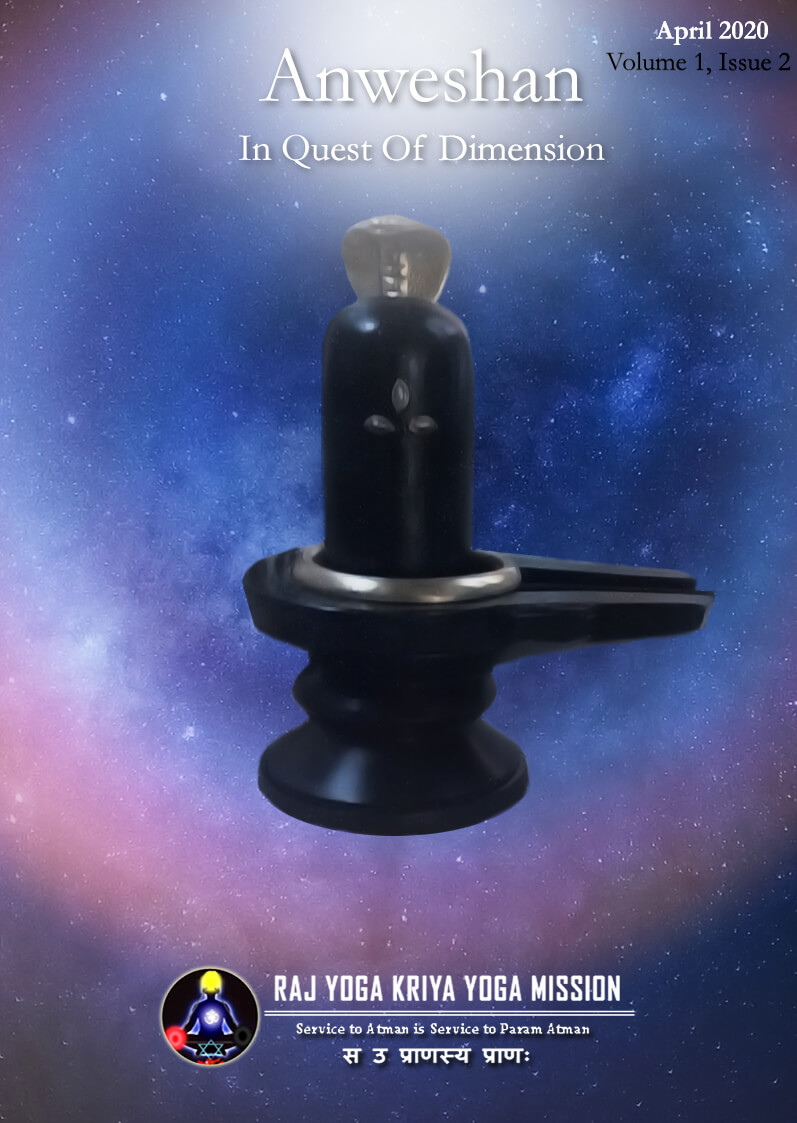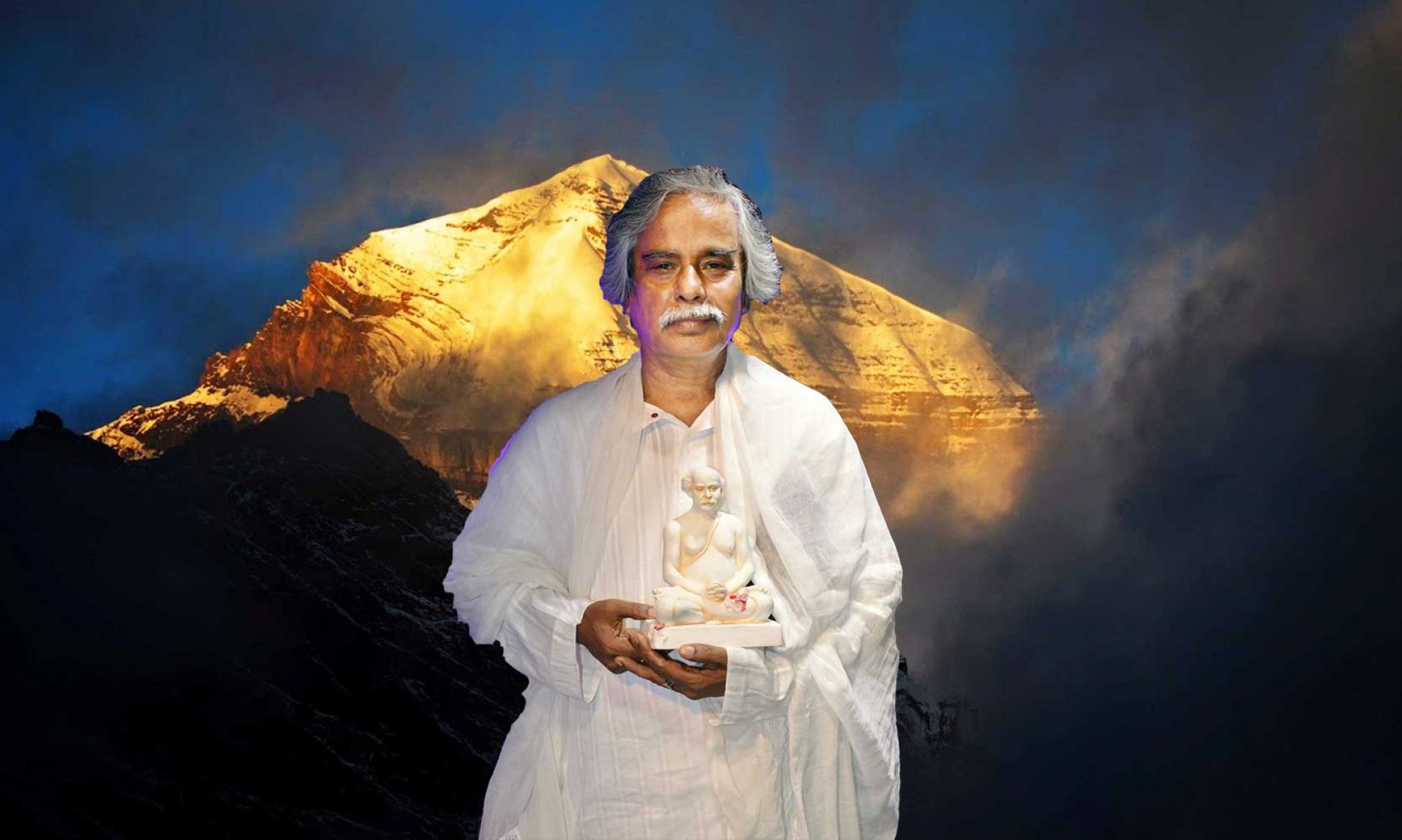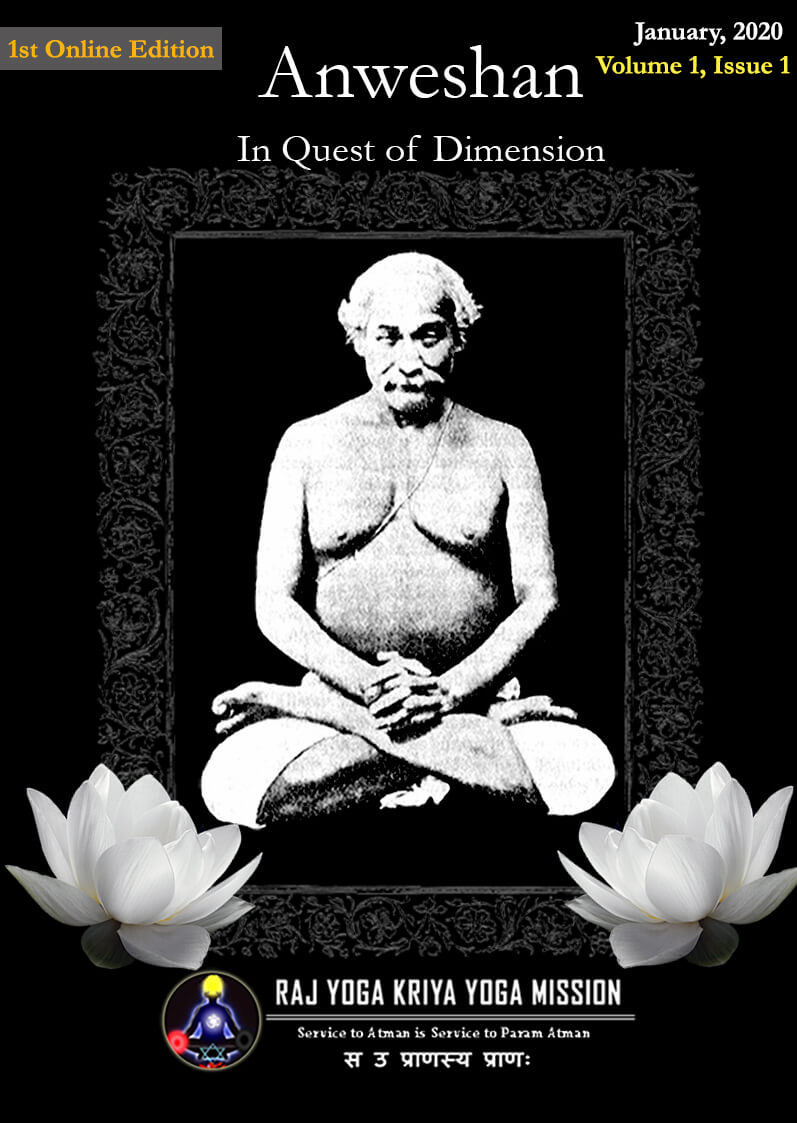This Article was Published in the Second Digital Edition of Anweshan
 Gurudeva used to tell the Kriyavans that let there be a development of the sense of equanimity in you. By performing Kriya in a right manner, a sense of composure arises in the mind. But what is called equanimity or composure of mind? If it is to be explained in simple words, then the state of maintaining inner peace between the various events of our life can be called equanimity. How can a man achieve peace and equity? Complexity of mind is the reason of anxieties. The conflict of ego and conscience is the cause of man’s internal feud, which appears in the form of various impulses on the mental plane. Here, impulse represents an unstable state of mind.
Gurudeva used to tell the Kriyavans that let there be a development of the sense of equanimity in you. By performing Kriya in a right manner, a sense of composure arises in the mind. But what is called equanimity or composure of mind? If it is to be explained in simple words, then the state of maintaining inner peace between the various events of our life can be called equanimity. How can a man achieve peace and equity? Complexity of mind is the reason of anxieties. The conflict of ego and conscience is the cause of man’s internal feud, which appears in the form of various impulses on the mental plane. Here, impulse represents an unstable state of mind.
There is both happiness and sorrow in all the events of life, which keeps a human being engaged. All these incidents are mostly a play of impure nature. Being involved in these worldly plays, man not only invites them in his life but also encourages them. Hence, this play continues forever.
When defeat, condemnation, and insult keep entering in life, then the impulse rises in the mind, and a person starts thinking what to do now? While on the other hand, on encountering events that bring happiness, joy, and feeling of victory, a person starts rejoicing, thinking that everything is going on fine in life. Gurudeva used to say that if one wants to receive the lasting bliss, then one has to rise above nature. But everyone used to ask him that how is it possible? Then Gurudeva used to reply, “Keep practicing Kriya daily, you will understand yourself”.
The doubts of a Kriyavan does not end with this. , He thinks that he is anyway happy, and if he/she continues his/her spiritual practice, then he/she may be unable to fulfil the worldly responsibilities, or what will happen if his/her world of attachment and indulgence is destroyed? Amid so many worldly duties, how should he/she find time for the spiritual practice? Among excuses like these, a Kriyavan does not want to relinquish the pleasure derived from that impure nature. As long as our consciousness remains in state of inertia, all these thoughts come from within, due to the interplay of the three gunas (qualities). If you want to be free from these feelings, then the degree of all the three qualities has to be transcended.
With the help of Kriya Yoga, the path of transcendental spiritual progress becomes easy. As a result of this, a person understands the real sense of Tamasic, Rajasic and Sattvik qualities, and gets the ability to understand what is “equanimity”, by going beyond these three qualities. The interpretation of equanimity can be found in verses 56 and 57 of the second chapter of the Bhagavat Gita.
duḥkheṣhv-anudvigna-manāḥ sukheṣhu vigata-spṛihaḥ
vīta-rāga-bhaya-krodhaḥ sthita-dhīr munir uchyate।।2.56।।
He, whose mind is undisturbed amid sorrows; who is free from desire amid pleasures; and one who has become devoid of longing, fear and wrath, is said to be a firm-minded sage with stable intellect.
yaḥ sarvatrānabhisnehas tat tat prāpya śhubhāśhubham
nābhinandati na dveṣhṭi tasya prajñā pratiṣhṭhitā ॥2.57॥
He, who has no desire in anything; and who neither rejoices nor hates on getting this or that, good or bad, his intellect is properly stabilized.
In this world, one who can endure the force of lust and anger in this body, is the natural yogi. Only such a person is truly in bliss.
The interaction of senses with the world is the cause of happiness and sorrow. Therefore, if you want to be completely free from these troubling senses, then you will have to seek shelter from a person who possess the knowledge of satvikta and the higher self. This realization is the after-state of Kriya (paravastha), or the transcendental state of three qualities.
The person who has attained the after state of Kriya, doesn’t see the supreme being only within himself, but sees it within every being, and experiences his unity with all. Therefore, he considers the happiness and sorrow of others as his own, but at the same time, remains untouched by the emotions of happiness and sorrow. This kind of enlightened Kriyavan is always generous and wishes for others’ welfare. Even after attaining this state, such a Kriyavan does not spend his life in solitude, but always wants to serve this world and the divine that dwells in every being. After attaining this state, he not only remains a yogi but becomes a devotee and a lover of God. He wants to love and serve people as soon as he gets an opportunity. His desire arises from the supreme being within. This belief settles into the Kriyavan and that is why he attains equanimity.
Hindi Translation:
गुरदेव क्रियावानो से कहा करते थे कि तुम्हारे अंदर समत्व भाव का विकास हो | सठिक तरीके से क्रिया करने पर मन में समता के भाव का उदय होता है | किन्तु समत्व या समता किसे कहते है | अगर इसे सरल रूप से समझाया जाय तो जीवन के विभिन्न के घटनाओ के बीच में आंतरिक शांति बनाए रखने की अवस्था को समता कहा जा सकता है | मनुष्य किस तरह से शांति और समता प्राप्त कर सकता है ? मन की जटिलता ही समाताहीन स्थिति का कारण है | अहंकार और विवेक का द्वन्द ही मनुष्य के आंतरिक द्वन्द का कारण बनकर विभिन्न आवेगो के रूप में सामने आता है | आवेग मन की अस्थिर अवस्था है |
मनुष्य जिन घटनाओ में व्यस्त रहता है उन सब में सुख और दुःख दोनों ही है | यह सब घटनाए अधिकांशतः ही निम्न प्रकृति का खेल है | इन खेलो में युक्त होने के कारण मनुष्य केवल इनको ग्रहण ही नहीं करता बल्कि इनको बढ़ावा भी देता है | इसलिए सदा के लिए यह खेल जारी रहता है |
जीवन में जब पराजय, निंदा, अपमान आते रहते है तब मन का आवेग प्रबल हो उठता है, क्या करे कुछ सूझता नहीं है| और जिन घटनाओ से सुख, आनंद, और जय की अनुभूति होती है उसमे मनुष्य नाच उठता है और सोचता है सब कुछ ठीक ही तो है | गुरदेव कहते थे कि की अगर स्थायी आनंद पाना है तो प्रकृति के ऊपर उठना होगा | पर सभी उनसे ये पूछते थे कि यह किस प्रकार संभव है ? तब गुरुदेव कहते थे की “रोज क्रिया का अभ्यास जारी रखो स्वंय ही समझ जाओगे” |
क्रियावान का संशय इससे भी समाप्त नहीं होता वह सोचता है कि – सुख से तो हूँ फिर अगर साधना के चक्कर में सांसारिक जिम्मेदारियां न निभा पाऊ तो या मेरे चाहत का संसार अगर नष्ट हो जाए और इतने सारे कामो के बीच साधना का समय कैसे निकालू? इसी प्रकार तमाम बहानो के बीच वो अशुद्ध प्रकृति का जो आनंद उसे त्यागना नहीं चाहता | हमारी चेतना जब तक जड़वत होती है तब तक तीन गुणों का अधीन होने के कारण ये सारे विचार हमारे अंदर से ही आते है | इन भावनाओ से अगर मुक्त होना है तो तीनो गुणों के स्तर को अतिक्रम करना होगा |
क्रियायोग की सहयता से ऊर्ध्वगमन का पथ सहज हो जाता है | इसके फलस्वरूप तामसिक सत्ता, राजसिक सत्ता और सात्विक सत्ता का बोध आता है और तीन गुणों के परे जाकर “समता” क्या है समझने की क्षमता आती है | समता की व्याख्या गीता के दुसरे अध्याय के ५६ और ५७ में श्लोक में हमे मिलते है |
दुःखेष्वनुद्विग्नमनाः सुखेषु विगतस्पृहः।
वीतरागभयक्रोधः स्थितधीर्मुनिरुच्यते।।2.56।।
दुःखोंकी प्राप्ति होनेपर जिसके मनमें उद्वेग नहीं होता और सुखोंकी प्राप्ति होनेपर जिसके मनमें स्पृहा नहीं होती तथा जो राग, भय और क्रोधसे सर्वथा रहित हो गया है, वह मननशील मनुष्य स्थिरबुद्धि कहा जाता है।
य: सर्वत्रानभिस्नेहस्तत्तत्प्राप्य शुभाशुभम् |
नाभिनन्दति न द्वेष्टि तस्य प्रज्ञा प्रतिष्ठिता ॥2.57॥
सब जगह आसक्तिरहित हुआ जो मनुष्य उस-उस शुभ-अशुभको प्राप्त करके न तो अभिनन्दित होता है और न द्वेष करता है, उसकी बुद्धि प्रतिष्ठित है।
इस संसार में जो इस देह में काम, क्रोध का वेग सहन कर पाते है वह ही प्राकृतिक योगी है | वही सुखी है |
जागतिक वस्तुओ के साथ इन्द्रियों का सम्पर्क ही सुख और दुःख का कारण है | इसलिए सम्पूर्ण रूप से अगर विक्षोभकारी इन्द्रिय से मुक्ति चाहिए तो उस व्यक्ति से आश्रय मांगना पड़ेगा जिसे सात्विकता और बुद्धि का ज्ञान है | यह बोध ही क्रिया की परावस्था या त्रिगुणातीत अवस्था है |
जो क्रियावान क्रिया की परावस्था में रहता है वो केवल अपने अंदर ही नहीं वरन प्रत्येक के भीतर उसी परम आत्मा का दर्शन करता है एवं सभी के साथ अपने एकात्मता का अनुभव करता है | इसलिए दूसरो के सुख दुःख को वो अपना समझता है पर सुख दुःख में कभी विचलित नहीं होता | इस प्रकार का ज्ञानी क्रियावान सदा उदार और दूसरो की मंगल कामना करता है | वे इस अवस्था को प्राप्त करके भी एकांत में जीवन नहीं बिताते अपितु संसार के मंगल के लिए एवं इस संसार में प्राणियों के अंदर जो परमात्मा है उसके सेवा के लिए सर्वदा कार्यरत रहना चाहता है | इस अवस्था को प्राप्त कर वो केवल योगी ही नहीं रहता वरन वो एक भक्त और भगवद प्रेमी बन जाता है | वो मनुष्य मात्र को देखते ही उसको प्रेम और सेवा करना चाहता है | उसकी यह इच्छा अंदर स्थित भगवन से उत्पन्न होती है यह धारणा क्रियवान में रच बस जाती है और इसी कारण वो समता को प्राप्त होता है |


 The Kriyabans have to strengthen the belief that for some reason we are born as per the will of the Creator. Many Kriyabans say that though they are practicing Kriya daily, yet they are not feeling motivated or inspired. Actually, the fact is, Kriya is not a tool for personal fulfillment or liberation. This method is an effort to “bring the divine power, light, and consciousness into you, and to elevate yourself to a superhuman state”. – (Sri Aurobindo)
The Kriyabans have to strengthen the belief that for some reason we are born as per the will of the Creator. Many Kriyabans say that though they are practicing Kriya daily, yet they are not feeling motivated or inspired. Actually, the fact is, Kriya is not a tool for personal fulfillment or liberation. This method is an effort to “bring the divine power, light, and consciousness into you, and to elevate yourself to a superhuman state”. – (Sri Aurobindo)